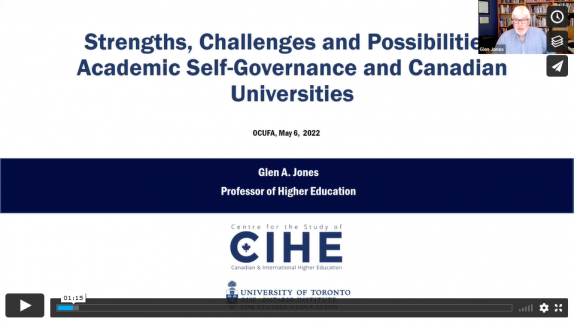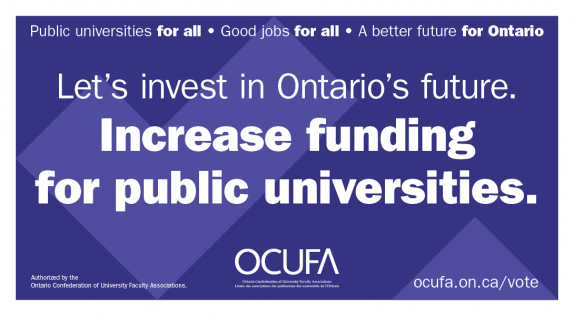On the weekend of May 14–15, the OCUFA Board met for its first hybrid meeting since the beginning of the pandemic and the final meeting of the 2021-22 academic year. Members attended in person and joined virtually from across Ontario to discuss the provincial election, political advocacy, on-campus action, and new postsecondary education developments in Ontario. In addition, new members of the Executive were elected for the 2022-23 academic year.
2022 Ontario provincial election
With the provincial election in full swing, members were presented with updates on where the major parties stood on OCUFA’s election priorities, what announcements they had made as part of their platforms, and the ridings that would be key to determining the next provincial government. In addition, the meeting provided an opportunity to highlight member events and actions in ridings across the province, including those associated with the Ontario Federation of Labour’s May 1 Day of Action, as faculty, academic librarians, and other academic professionals sought to pressure their local candidates into supporting Ontario’s public universities.
Now that a Progressive Conservative government has been re-elected, OCUFA’s advocacy work will refocus on pushing this government to consider a new approach to postsecondary education while working with faculty to build a university system that receives strong support from the provincial government.
Laurentian University
Laurentian University is now into its second year struggling to rebuild following the university administration’s unprecedented decision to use the Companies’ Creditors Arrangement Act (CCAA) to gut the university by closing dozens of programs and cutting hundreds of jobs. OCUFA has long called for the university’s senior administration to resign and for the provincial government to step in with immediate and long-term financial support.
In the wake of scathing reports from the Auditor General of Ontario and the French Language Services Commissioner of Ontario, the OCUFA Board passed a formal motion reaffirming OCUFA’s demand that Laurentian President Robert Haché, Provost Marie-Josée Berger, and Associate Vice-President Serge Demers resign from their positions immediately.
New Equity Toolkit
Meeting participants were presented with OCUFA’s new Employment Equity Toolkit, which is intended to provide a wide variety of examples of how to imagine and incorporate an equity lens into faculty and academic librarianship association work. The toolkit was developed by a special working group, which reviewed equity policies at universities across Ontario and developed a primer and comprehensive checklist to guide associations in their efforts to improve equity at their institutions and within their own structures.
Additional governance resources
Representatives for OCUFA’s University Governance Committee reviewed the most recent resources developed by the group, noting the important work involved in bolstering shared collegial governance at Ontario’s universities—especially in the wake of the COVID-19 pandemic, which resulted in an erosion of collegial governance practices at many Ontario universities.
Bargaining
This has been a busy year for university bargaining, with many faculty associations currently at the table. Part of the Board meeting focused on OCUFA’s Countdown to Strong program, which is meant to support member associations in leveraging their power at the bargaining table. Bill 124 and the re-election of the Ford government mean strong campus unions have become even more important for ensuring that the interests of faculty, academic librarians, and other academic professionals are defended.
Presentation on the University Pension Plan
The Board meeting featured a special presentation from representatives of the University Pension Plan (UPP). Barbara Zvan (President and Chief Executive Officer), Gale Rubenstein (Chair of the Board of Trustees), Joanna Lohrenz (Chief Pension Services Officer), Faisal Siddiqi (Managing Director, Actuarial), and Cynthia Messenger (Employee Sponsor’s representative) provided a comprehensive overview of the UPP. They described its shared governance structure, provided updates on its development, showed how it compares to other pension plans, and gave some details on the process involved in moving to the UPP from another pension plan for those who may be interested.
This was part of an ongoing series of workshops and educationals designed to assist member associations in considering the best pension options for their members.
Health and safety
On Ontario’s university campuses, many masking and vaccination mandates are being rolled back as we head into the summer. OCUFA members discussed the safeguards in place on their campuses and the role OCUFA might play in ensuring proper provincial guidance is in place for the fall term.
Election of 2022-23 OCUFA Executive
Congratulations to the newly elected OCUFA Executive who will take office on July 1, 2022.
Chair of Board: Associate Professor Gyllian Phillips, Nipissing University Faculty Association
Members-at-large:
- Associate Professor Daniel Paré, Association of Professors of the University of Ottawa
- Contract Faculty Instructor Kimberly Ellis-Hale, Wilfrid Laurier University Faculty Association
- Associate Professor Kate Lawson, Faculty Association of the University of Waterloo
They will join President Sue Wurtele (Trent University Faculty Association), Past-President Rahul Sapra (X/Ryerson Faculty Association), and Treasurer Mike Eklund (University of Ontario Institute of Technology Faculty Association) whose term was extended for another year by a vote of the Board.
In addition, it was announced that an election for Vice-President would be held at a special meeting on June 17, following the resignation of Vice-President Jennifer Sutton, effective June 30, 2022.
The next regularly scheduled OCUFA Board of Directors meeting will be held in October 2022.












